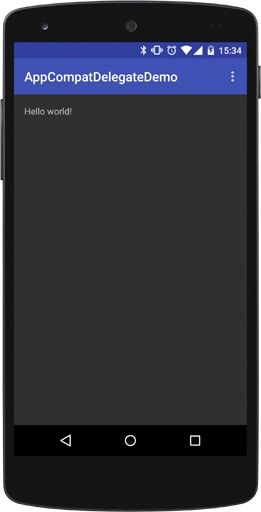如何给非AppCompatActivity添加Toolbar?--关于5.0新特性兼容5.0以下设备的探索
Android支持包22.1引进了AppCompatDelegate
最新22.1版本的支持包引入了大量酷炫的新特性,这些特性将允许我们轻易地将材料设计/API 21+的特性应用到之前的那些老的,不兼容的Activity上面。
我们知道,继承AppCompatActivity是最容易实现的方式,但是有时候我们还是需要使用老办法,对吗?
你可以使用支持包提供了新的AppCompatDelegate构件,很容易地将Toolbar添加到Activity上。
1,将Toolbar控件添加到布局文件上面
ActionBar现在已经被不再被告维护了,它应该被Toolbar取代,因为后者允许了更多的UI灵活性,并且允许Activity更容易地兼容于材料设计的UI模式。
因为我们要在这使用支持包,那么我们将使用Toolbar的支持版本,不然的话,将只能在API 21+上可用。
在xml中添加如下内容:

1 <android.support.v7.widget.Toolbar 2 android:id="@+id/my_awesome_toolbar" 3 android:layout_height="@dimen/abc_action_bar_ 4 default_height_material" 5 android:layout_width="match_parent" 6 android:minHeight="@dimen/abc_action_bar_ 7 default_height_material" 8 android:background="?attr/colorPrimary" 9 />
2,修改主题:
因为我们要将Toolbar嵌入到布局文件中,所以我们需要不支持ActionBar的主题。
所以,在确定在styles.xml文件中使用主题Theme.AppCompat.NoActionBar。
特别推荐,要在你的主题上添加如下所示的材料设计色彩项,这将很容易地实现对Toolbar和状态栏的着色(只有API 21+的设备上才会对状态栏进行着色):

1 <!-- Base application theme. --> 2 <style name="AppTheme" parent="Theme.AppCompat.NoActionBar"> 3 <!-- colorPrimary is used for coloring the Toolbar --> 4 <item name="colorPrimary">#3F51B5</item> 5 <!-- colorPrimaryDark is used for coloring the status bar --> 6 <item name="colorPrimaryDark">#303F9F</item> 7 <!-- colorAccent is used as the default value for colorControlActivated 8 which is used to tint widgets --> 9 <item name="colorAccent">#FFAB40</item> 10 </style>
3,将AppCompatDelegate添加到Activity里面
AppCompatDelegate是一个委托代表,它将AppCompatActivity的特性提供给Activity,而且只能通过create()方法创建,此时它需要两个参数,Activity和AppCompatCallback。
所以,首先,我们将Activity实现AppCompatCallback接口,在本例中,可以不必具体实现要覆盖的方法。

1 public class MainActivity extends Activity implements AppCompatCallback { 2 @Override 3 public void onSupportActionModeStarted(ActionMode mode) { 4 //let's leave this empty, for now 5 } 6 @Override 7 public void onSupportActionModeFinished(ActionMode mode) { 8 // let's leave this empty, for now 9 } 10 }
然后,在Activity的onCreate()方法中,
- 通过AppCompatDelegate.create()方法创建AppCompatDelegate;
- 调用AppCompatDelegate.create();(有些Activity的生命周期方法应用由该AppCompatDelegate代理)
- 通过AppCompatDelegate.setContentView()方法填充布局文件;
- 通过AppCompatDelegate.setSupportActionbar()将Toolbar添加给AppCompatDelegate。

1 private AppCompatDelegate delegate; 2 @Override 3 protected void onCreate(Bundle savedInstanceState) { 4 super.onCreate(savedInstanceState); 5 //let's create the delegate, passing the activity at both arguments (Activity, AppCompatCallback) 6 delegate = AppCompatDelegate.create(this, this); 7 //we need to call the onCreate() of the AppCompatDelegate 8 delegate.onCreate(savedInstanceState); 9 //we use the delegate to inflate the layout 10 delegate.setContentView(R.layout.activity_main); 11 //Finally, let's add the Toolbar 12 Toolbar toolbar= (Toolbar) findViewById(R.id.my_awesome_toolbar); 13 delegate.setSupportActionBar(toolbar); 14 }
特别推荐,一个Activity只能链接到一个AppCompatDelegate实例,因此通过create()方法返回的实例应该保存在Activity里面直到该Activity被销毁。
现在,你已经完成了,运行你的应用,然后你的Activity将会魔法一般拥有一个Toolbar,而且看起来完全你是材料设计的AppCompatActivity!

非常简单?
再次声明,这只是边缘事例,在使用AppCompatDelegate之前,问题要考虑使用AppCompatActivity。
同时,一定要检出AppCompatDelegate的完全引用。如果你想要AppCompatDelegate活动地完全像一个AppCompatActivity,那么在你包裹AppCompatDelegate到Activity时将有大量的方法需要考虑写。
